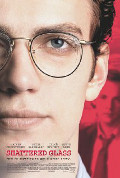
Directed by
Billy Ray
104 minutes
Rated M
Reviewed by
Bernard Hemingway


Shattered Glass
Synopsis: Stephen Glass (Hayden Christensen) is a staff writer for The New Republic, a much-respected US current affairs and policy magazine, and a freelance for other notable magazines such as Rolling Stone and Harpers. When in mid-1998 an opposition journo Adam Penenberg (Steve Zahn) discovers sign that Glass had fabricated one of his stories his world and that of his colleagues begins to unravel.
The dictum ‘truth is stranger than fiction’ is certainly borne out in this intriguing real life story by writer/director Billy Ray. Not only is it an interesting peek at the behind-the-scenes operations of a supposedly hard-hitting investigative journal (we find out that the average age of the writing staff of The New Republic was a mere 26, Glass the youngest at 24), it is a fascinating study of its central character, part boy-next-door charmer, part calculating liar, and the ways in which the approximate universe in we which we live is based on the unspoken assumption that we deal honestly with each other.
Of course, whilst a certain glossing of the facts has resulted from making the character and events into filmed entertainment, the film's strength is that it is intelligently-written and well constructed, being faithful to its rather low-key subject matter (compared to genre-related films like All The President’s Men, 1976) and The Insider, 1999) yet gripping us as tightly as a first-class thriller. Ray in his directorial debut is very good at splitting the point of view between what we as the audience know and what the Glass’s colleagues know, the tension arising from the dissonance between the two.
Whilst Shattered Glass is perhaps narratively a little too neat and there is no attempt made to explain Glass's fabulism, for anyone wanting an engaging drama without big budget production values or plot contrivances (surprisingly it was executive produced by Tom Cruise and Lindsay Wagner’s company) it is a substantial and thought-provoking effort (unfortunately the IT, with the internet then in its awkward infancy, much as it is true to its time, dates the film).
Hayden Christensen does an excellent job of giving his character a near-pathological impassivity (one can't help but remember Will Smith in Six Degrees of Separation,1997), a self-possession that gradually disintegrates as Glass's unmasking unfolds. Peter Sarsgaard is also effective as Glass's editor, the only member of staff who did not fall under the latter's spell.
FYI: For all the film's championing of journalistic integrity, as 2003’s Jason Blair-Howell Raines scandal at The New York Times showed, this kind of deception is not isolated in American journalistic culture.
Want something different?





